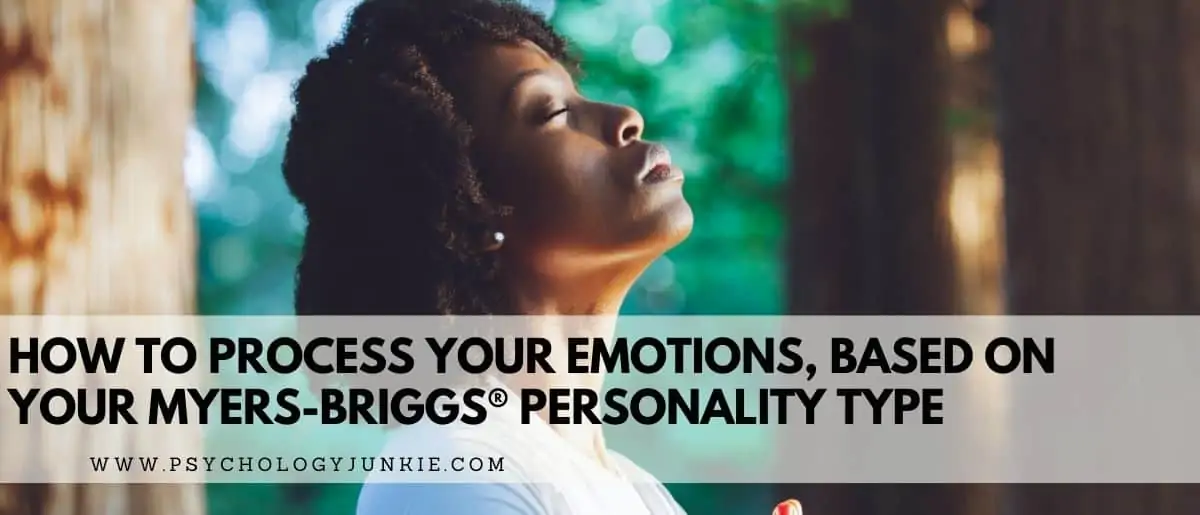How to Make Sense of Your Emotions, Based On Your Personality Type
Are you struggling to process your emotions or prioritize them? In today’s article we’re going to look at some techniques that can help you to get in touch with the feeling side of yourself. Making time to get in touch with your feelings can help you to make wiser choices, be less stressed, and avoid projecting suppressed emotions onto others!
Each of the techniques in this article can potentially be helpful so feel free to look at the suggestions for all 16 types. Some will be repeated because they’re effective for multiple types, but others are unique and may be just the thing you need!

Not sure what your personality type is? Take our new personality questionnaire here. Or you can take the official MBTI® here.
Table of contents
Estimated reading time: 23 minutes
Making Sense of Your Emotions, Based On Your Myers-Briggs® Personality Type
The ENFP
Get alone and shut out distractions, people, and devices. Allow nothing to get in the way of your own thoughts and reflections. When you get in touch with your feelings you probably feel more introverted than usual. This is an excellent time to get creative or start journaling. Many ENFPs report that they process their feelings through art, even if the quality isn’t the caliber they crave. Simply dipping their fingers in paint and spreading it across a page, each color evoking a new emotion, can be a therapeutic experience. Others simply sit quietly in the dark and allow their feelings to bubble up to the surface.
Emotion Practices for ENFPs:
- Free association journal. Get out a piece of paper and jot down your feelings and thoughts without any direction or structure.
- See if you can identify where in your body you’re feeling particular emotions. Is there a way you can address these physical feelings in a healthy way?
- Think about the decisions you’re facing in life. Close your eyes and tap into your intuition. What feels right in the moment? What is your heart telling you?
- In the midst of a disagreement or argument, pause and breathe. How are you feeling? What values are on the line? How can you honor them and the other individual in the situation?
- Play a musical instrument even if you don’t have the technical knowledge. Simply play according to how you’re feeling.
- Close yourself in a dark room and practice deep breathing. Be patient with yourself and allow the feelings to emerge on their own. Journal them afterwards if you’d like to.
Read this Next: Dealing with Emotional Overwhelm as an ENFP
The ENTP
Diving deep into your feelings can be a struggle because you tend to be more thought focused than emotion focused. At the same time, it’s vital that you give yourself time to process your emotions so that they don’t bubble up in unhealthy ways later. Taking time to allow yourself to simply feel whatever you’re going through is essential. This is often achieved in an external way; listening to music and finding a song that verbalizes what you’re going through, watching a movie that mirrors an experience or emotion you’re coping with, or talking to a trusted friend who will keep your feelings confidential. Getting a hug from a partner or getting a massage can also be healing.
Emotion Practices for ENTPs:
- Vent to someone you absolutely trust. Warn them that after you verbalize your feelings you might change how you feel. Many Thinking Perceivers and Feeling Judgers logically dissect their feelings while externalizing them, discarding certain emotions that they decide no longer make sense.
- Watch a sad movie or something emotionally profound that helps you process a similar emotion or experience.
- Listen to music and make a playlist of songs that help you process your emotions.
- Pause when you have to make a decision. What really makes sense to you and aligns with your principles? Don’t let yourself get pulled into people pleasing at the expense of your truth.
- Journal your thoughts and feelings when you feel confused or perplexed by them.
Read This Next: 10 Surprising Truths About ENTPs
The INFP
It’s crucial for you as an Introverted Feeling type to make space to explore your emotional terrain and inner feelings. Take a look at your schedule and cancel any non-essential activities and obligations. Allow yourself to be still and uninterrupted; shut the door on technology, distractions, and people. Take this time to listen to your heart. What parts of yourself have you been too busy, or too afraid, to listen to? Think about your core values and write them down. If this was your last day to live what would matter to you on an individual level? How would you tailor your life differently? Use artistic means to express yourself. Often, creativity is an easier way for you to express your emotions than simply verbalizing them.
Emotion Practices for INFPs:
- Calm your body and do whatever you can to feel physically calm and content before processing your feelings. Hydrate, splash your face, or go outside and breathe in some fresh air.
- Use creative materials to express your feelings in a free-association style. Use paint colors to symbolize different emotions, tinker at the piano and come up with a song that represents your current emotion. Find 100 easy art therapy exercises to help you process your feelings.
- What would you find especially meaningful or profound if this was your last day to live? How would you change your life? What values would take the spotlight? Journal your thoughts.
- Allow yourself to be “bored” with your feelings. Sometimes it takes sitting and being bored for a little while before the emotions and feelings you need to process bubble up.
- Listen to music that helps you process an emotion or feeling.
Read This Next: For the INFPs and INFJs Who Are Drowning in Worry
The INTP
You’re typically more interested in analyzing something logically than through your emotional experience. That said, you still need moments to process your feelings and express your emotions. Keep in mind that you’ll often have a temptation to rationalize away your feelings and move on to other territories when this happens. Often, for you, a good way to process your feelings is in an external way. Talk to someone you can totally trust and express your feelings, acknowledging that they may be messy and you may change your opinion about them after you’re done verbalizing them. Get a hug or just snuggle with a partner or family member. Write down your feelings without worrying whether they make sense or not, just get them out of your system. Most of all, don’t judge yourself for having emotions. Sometimes emotions can be lamp posts guiding us to a deeper truth about ourselves, our lives, or our relationships.
Emotion Practices for INTPs:
- Write down your emotions and feeling in a free-association way. Then read them back to yourself? What could your emotions be telling you? Which ones are pointing to a deeper truth and which ones are symptoms of something unrelated (fatigue, hunger, pain).
- Blast music in your house or car and allow yourself to dance or move with the music as a way of letting out your feelings.
- Vent to someone you trust about your feelings. Let them know that after you verbalize your feelings you might feel differently and “cancel out” some of what you said. Many TP and FJ personality types logically dissect their feelings while externalizing them, discarding certain emotions that they decide no longer make sense.
- Write a poem or haiku about your feelings. Make it a game if you have to, but try to express what you’re going through on paper.
- Identify where you are feeling emotions in your body. Is there something you need physically that you’ve been ignoring?
Read This Next: What It Means to be an INTP Personality Type
The ENFJ
For you, analyzing your own feelings and getting in touch with them is an experience often helped through external means. Talking about your feelings, writing them down, singing them, or simply saying them out loud can help you understand them. I’ve known ENFJs who dance to their feelings, play songs to their feelings, or find it best to talk to a counselor. The point is that most ENFJs process their feelings best when they can speak them and then process them through hearing them aloud. At the same time, because they talk out their feelings in order to understand them, they may change their minds about how they feel after they’ve let it all out. Upon hearing their feelings expressed verbally they may logically assess that some of their emotions weren’t consistent or logical. So if there is a witness to the ENFJ’s feelings, they must be patient and understand that the process of “venting” is another way of sorting out and keeping and later discarding various feelings.
Emotion Practices for ENFJs:
- You are naturally very conscious of other people’s feelings. In fact, sometimes you’re so busy taking care of other people’s feelings that you forget your own in the process. Make sure you’re taking time to express and understand your own emotions so that you can process them in a healthy way.
- Remember that it’s okay to have needs and it’s okay to ask for help. Many times ENFJs like you keep their own needs shut up and instead focus on the needs of others. Express your unmet needs out loud and realize that your needs matter just as much as anyone else’s.
- Realize what your boundaries are. Are you expending energy on people who have unacceptable behavior towards you? Sit with yourself and reflect on the behaviors that you want in your life, and those you do not. Then practice setting healthy boundaries so that you can have a healthier emotional life.
Read This Next: A Look Inside the ENFJ Mind
The ENTJ
You’re someone who tends to focus on action, efficiency, and tasks more than your inner world of emotions. But sometimes you feel them welling up inside of you, beckoning you to look deeper. It’s a temptation for any dominant thinking type to sweep those feelings under the rug, but that can result in irrational emotional reactions when stress causes those repressed emotions to burst forth uncontrollably. For you, taking time to get away from the pressures and noise of the world around you is crucial. Sequester yourself away to a quiet place where you can process what you’re feeling without distractions. Give yourself permission to be emotionally absorbed without shame. Watch a movie that makes you cry, blast songs that emotionally resonate with you, or simply vent about your feelings to someone you trust (I know it sounds scary, but you’re not someone who’s afraid of a challenge, right?).
Emotion Practices for ENTJs:
- Don’t be afraid to cry. Sometimes letting those feelings out can give you a sense of relief. Listen to songs that resonate with you or watch a movie that makes you cry if you’re struggling to process negative feelings like grief or sadness.
- Journal your feelings without worrying too much about how they sound. You can tear up the pages afterwards if you want to.
- Give yourself a little time each day, even if it’s only 20 minutes, to just be in your feelings. If that’s not enough time, give yourself more. Get to know yourself and allow yourself to think about what matters to you on a deep, personal level. Think about who you are, what’s important to you, and the choices that you’re making that honor or dishonor those values.
- Read a variety of books or listen to a variety of music that allows you to get in touch with the emotional experiences of a wider variety of people. This can help you to understand the feelings of others and yourself more readily.
The INFJ
As an INFJ you need to get regular time alone to process your feelings. When you’re around other people it’s too easy for you to get absorbed in their emotional experience and your own feelings get mixed up with theirs in the process. Taking some time away from others and the distractions they bring to the table is mandatory. When you do get away, take time to ground yourself in your physical body. Practice deep breathing, relax your body, and pinpoint any pressing physical needs that might need attending to (getting a drink, stretching your shoulders, etc,.). Then take some time to write down your feelings and read them back to yourself. Typing is sometimes faster than physically writing, but either will work fine. It’s important that you read your feelings back to yourself so that you can process what you wrote and sort out the feelings that are meaningful and which ones aren’t. It’s also helpful, after you’ve had some time alone, to talk to a friend or counselor you trust about what you’re going through. Usually you need a combination of quiet time alone and some feedback from others to process your feelings in the best way. You can find out more about this in the article I wrote: How INFJs Process Emotions.
Emotion Practices for INFJs:
- Talk out your feelings verbally, even if nobody is there to listen. Externalizing your emotions is an important way for you to process them. Just don’t be surprised if you feel differently about your feelings after you’ve had a chance to process them externally.
- Journal your feelings and read them back to yourself. Do this several times a week if possible and see if you notice any patterns about the things that are upsetting you or bringing you joy.
- Listen to music that mirrors your emotional experience.
- Read books about a wide variety of different people. Often reading about others’ emotional experiences can help you to understand your own in a more powerful way.
- Give yourself space to feel what you feel. Don’t fill your schedule so tightly with responsibilities that you don’t have time to get away, recharge, and process what you’re going through.
Read This Next: 7 Signs That an INFJ is Secretly Unhappy with Their Life
The INTJ
You’re someone who needs everyone to get away when it’s time to process your emotions. Blowing up and venting to the nearest available stranger is definitely not your way of handling things. For you, retreating from the noise and disruptions of the outside world is essential. Journaling your thoughts and feelings can be beneficial. Ask yourself questions like, “Who am I?” “What are my feelings telling me right now?” “What has meaning for me?” What matters to me in the long run?” Think about your values and the kind of person you want to be. Are your emotions giving you a signal that you’re betraying something important to you as a person?
Emotion Practices for INTJs:
- Practice meditation, deep breathing, or mindfulness techniques to process your feelings in a healthy way. Here are five simple daily mindfulness practices.
- Notice your emotions. Name your emotions. Allow them to exist and feel them within your body. Stay with those emotions as the deeper layers bubble up and you understand the underlying meanings for them. Relax your body. Breathe deeply. Reconnect with yourself and think about how you can address them in a healthy way. Find out more about the 9 mindful ways of processing emotions.
- Take time to tune into your body. Are your emotions triggered by various aches and pains in your body? Are you exhausted, in pain, dehydrated, or hungry? Sometimes sensing inferior types (INTJs and INFJs) can feel disconnected from their bodies and feel emotions as a result of physical ailments left untended.
Read This Next: 10 Things That Excite the INTJ Personality Type
The ESFP
While you typically like a lot of activity and commotion, when it comes time to process your feelings you need life to quiet down. Close the door on the outside world and let yourself breathe in the tranquility and peace of having no expectations placed on you. Breathe deeply, relax your body, and let yourself feel whatever it is you need to feel. Journaling is an effective way to manage stress and emotional overload. How can you end negative emotions on a positive note? Is there a nugget of hope that you can think of? Think of a creative way you could process your emotions; draw, paint, dance, sculpt! Eat a healthy snack, drink a glass of ice water, take a nap, or shower and let the water clear away some of the stress and overwhelm you’ve been dealing with.
Emotion Practices for ESFPs:
- Draw how you’re feeling (and don’t berate yourself if you’re not a natural artist!)
- Punch a pillow if you’re angry or find a quiet place you can drive to and scream in your car (it might feel silly, but it’s effective)
- Write your feelings in a journal, as a poem, or make a collage of your emotions
- Find a guided meditation on YouTube to help you relax and center yourself
- After you’ve had some time to decompress and process, talk to a friend you trust to find connection and support
The ESTP
You tend to be someone who thrives on action, activity, and tough love. That tough love tends to extend to yourself as much as it is extended to others. When it comes to your feelings, it’s easy to feel like they’re “silly” or “weak.” But you need to work on shutting off that scolding voice in your mind! When you fail to consider your feelings you can wind up making choices that don’t ultimately make you happy or you may act in emotionally disruptive ways without intending to. For you, working out your emotions is often an external process. Talk out your feelings while you’re driving your car, write them down without worrying about how they sound, listen to music that mirrors your emotions, or vent to someone you trust. Often physical affection can help you to feel safe and connected (hugs and cuddles make excellent medicine). It’s just important to know that as you verbally express your feelings you’re likely to realize some make sense and others do not. That’s okay. Thinking-Perceivers and Feeling-Judgers need to go through this external process to sort everything out and make sense of it all.
Emotion Practices for ESTPs:
- Ask someone to just sit with you and listen to you as you express yourself. Remind them that you’re just venting and you may not mean everything you say 100%.
- Listen to music or watch a movie that resonates with your emotional experience
- Try progressive muscle relaxation – clench your toes for a count of 5, then relax them for 5 seconds, then move to your calves, your thighs, your abs, arms, then neck.
- Unplug for a while and let yourself sit with your emotions. Write them down, say them out loud, or just allow yourself to be still long enough for them to bubble up and be addressed.
- Go for a walk or do some other low-intensity exercise while you think about your feelings and what they mean to you.
The ISFP
Getting in touch with your emotions usually involves getting away from the world outside and assessing what really matters to you on a personal level. Spend a few minutes answering the question “how am I doing right now?” Focus on the sensations that arise as you’re processing this question. Next, focus on deep breathing. Feel the way in which your breathing is affecting the rest of your body. Take time to stretch every part of your body, from your toes to your neck. When you’ve been able to relax and ground yourself in your body then get creative with your feelings. Jot them down and organize them into a poem, listen to a song that mirrors your emotions and dance or sing along, dip your fingers in paint and swipe across a canvas with colors that symbolize your emotions.
Emotion Practices for ISFPs:
- Take time to realize that there are four parts of yourself. There’s the soulful, emotionally profound part of you. There’s the realistic, detail-conscious side of you. There’s the intuitive, big-picture focused part of you. There’s the analytical, logical part of you. When you’re confused about an emotion, imagine those four parts of yourself having a conversation together. Give each side of yourself space to “speak” into your experience. Jot down any notes that you might have. Is there a certain part of you that you’ve been avoiding listening to? What insights can you gather when you give all four parts of you a chance to breathe?
- Choose an art form to use to explore or express your emotions. Try playing an instrument, doodling with a pencil, dancing while nobody’s looking, or making a collage out of pictures and quotes you find online.
- Practice mindfulness techniques on a regular basis to help you get in touch with your body, emotions, and the world around you.
Read This Next: INFPs, ISFPs and Empathic Mirroring
The ISTP
You don’t typically dwell on your emotions much, instead preferring to gather data or bits of knowledge that are provable. Yet it’s important to make time to prioritize your feelings because if you don’t they can simmer to the surface and cause problems for you later on. Releasing inner tensions can give you a state of catharsis , which is healthy. Take time to press pause on your life and get some time alone with yourself. Take deep breaths and stretch your body. Cut out distractions like your cell phone or television if possible. Then take some time to externalize your feelings, either out loud or through writing them down. If you’re angry, punch a pillow or scream; it may seem silly but people who suppress their feelings experience less positive and more negative emotions. Writing about your feelings or any traumas you’ve been dealing with can also improve your psychological state. You can also benefit from talking about what you’re going through with someone you trust.
Emotion Practices for ISTPs:
- Use clay or paint to create something around your emotions.
- Exercise to release stress-reducing endorphins while you think through your emotions
- Practice reaching out to someone you trust and sharing your heart with them
- Practice mindfulness techniques on a regular basis to help you get in touch with your body, emotions, and your environment.
- Listen to music that resonates with how you are feeling internally.
Read This Next: 10 Things You Should Never Say to an ISTP
The ESFJ
Your biggest challenge with getting in touch with your own feelings is stepping away from the feelings of all the people around you. You tend to lead a busy, social life filled with engagements and conversations. You’re also an empathetic person who tends to take on the emotions of the people around you. In order to get in touch with your own feelings it’s helpful for you to get some time alone to figure out which feelings are your own and which are those of other individuals. After you’ve had a chance to do this then reaching out to someone is extremely helpful. As an extraverted feeling type, you analyze feelings better when they are verbalized. Hearing yourself talk about your feelings, to yourself or someone else, can help you to sort out which emotions are meaningful and which are not. Writing them down can also be a good way to sort them out, just try to read them back to yourself after you write them.
Emotion Practices for ESFJs:
- Make a collage to express or connect with your feelings. Right down quotes that resonate with you, cut out pictures, and glue them all on a page.
- Write a letter with all your angry or negative emotions, the tear it up and throw it away.
- Consider talking to a therapist who can help you make sense of your feelings if they seem too confusing or muddled.
- Sing and dance to a song that expresses your emotions (hopefully you can have an empty house for this because it really helps to let loose!)
The ESTJ
You’re someone who believes in hard work, action, and decisiveness. Diving into your feelings is something you don’t typically do, and if you lead a busy life (which most ESTJs do) then you’re likely to put emotional processing last on your priority list. But this can lead to negative outcomes in the long run; suppressed or ignored emotions tend to bubble up into over-reactions or projections onto other people. It’s important for you to take some time each day to get away from the world, quiet things down, and ask yourself what really matters to you. When you do that, you can analyze whether you’re living a life that aligns with your task list or your true heart desires and ethics. Writing down your feelings as well as your values and keeping track of how well you’re honoring those things can help you to line up your life with what’s important to you in the long run. It can also help you to find the source of negative or positive emotions and avoid projecting unprocessed emotions onto other people.
Emotion Practices for ESTJs:
- Use an app like the Mood Meter to track your moods and label, express, and regulate them.
- Write down 3 emotions you’re feeling next to three physical ways those emotions are manifesting themselves. For example, “Sad, hopeless, anxious – Heavy, low-energy, limp” then think of three ways you could heal those symptoms “talk to someone, take a nap, go outside”
- Don’t be afraid to talk to someone you trust about what you’re going through emotionally. Let them know ahead of time if you don’t want advice.
- Spend time exercising or walking outside to reduce stress, get a change of scenery, and feel more revived.
- Let out emotions in a physical way in order to ease tension and lower your heart rate. Punch a pillow, scream, dance, or go on a drive and sing along to the radio at the top of your lungs.
The ISFJ
You’re a quiet and gentle individual who craves a life that is serene and predictable. Keeping your environment in a stress-free state is crucial to you, but sometimes you get so busy taking care of other people’s needs or feelings that you forget your own in the process or suppress them. In the long run this only leads to further frustration as suppressed emotions tend to lead to more negativity, higher heart rate, and a higher physical stress load on your body. For you to process your emotions you usually need an external outlet or sounding board. Writing your feelings down and reading them back to yourself is helpful. I know one ISFJ who channels her feelings into poetry or short stories. It’s also highly beneficial to have someone to verbalize your feelings with without fear of judgment. When you can verbally process what you’re going through you can make sense of it; when you keep it bottled up inside it can blow out of proportion or become suffocating.
Emotion Practices for ISFJs:
- Don’t be afraid to ask for a listening ear! True friends want to be there for you. Let them know that as you verbally process your feelings you might decide some of them were nonsensical and others were important. Ask them to refrain from judging or giving their opinions until you’ve reached the end of verbalizing them.
- Write down your emotions and their corresponding physical effects. For example, “I feel depressed and tired” or “I feel happy and jittery.” Think of ways you can tend to the physical symptoms of your emotional state. Maybe you need a nap, a glass of water, some exercise, or a warm hug.
- Play music that resonates with your feelings or watch a movie that helps you to let out some of your feelings (many FJs feel a sense of catharsis by watching a movie that mirrors their emotions).
- Practice mindfulness techniques to help you get in touch with your body, emotions, and the world around you.
Read This Next: Confessions of an Unhealthy ISFJ
The ISTJ
You’re someone who holds your emotions close to the chest, preferring to deal with them independently rather than bringing other people on board to help. While that isn’t always a bad thing, it’s important not to suppress your feelings. Over time this can lead to increased negativity and stress on your body. When you’re going through stress or emotional pain, find a healthy physical outlet for your pain – whether that’s punching a pillow, kicking a ball, screaming in your car, or exercising. It’s also helpful to track your emotions and their triggers through journaling or using a mood meter. Tracking your feelings and their origins can help you to understand yourself better as well as the things that inspire or exhaust you.
Emotion Practices for ISTJs:
- Take time to physically relax your body before processing your emotions. Breathe deeply, stretch, drink a glass of water. The more physically grounded you are the more accurately you can assess what you’re going through emotionally.
- Give voice to your emotions. Verbalizing what you’re going through can help to de-intensify the intensity of the emotion and give you relief.
- When you’re struggling with a negative emotion, talk to yourself from a place of acceptance, forgiveness, and nurturance. What would you tell your own child if they were struggling with these emotions?
- Journal your feelings regularly. Give voice to the profound, feeling side of yourself, the tough, logical side of yourself, and the factual, sensing side of yourself. Let those sides “speak” to each other so that you can process your emotions and your actions related to them with wisdom.
Read This Next: 24 Signs That You’re an ISTJ, the Detective Personality Type
What Are Your Thoughts?
Did you enjoy this article? Was it helpful to you? Share your insights or suggestions with other readers in the comments!
Find out more about your personality type in our eBooks, Discovering You: Unlocking the Power of Personality Type, The INFJ – Understanding the Mystic, The INTJ – Understanding the Strategist, and The INFP – Understanding the Dreamer. You can also connect with me via Facebook, Instagram, or Twitter!









I learned most of what you tell about here through hard experiences. Surprised to see all of them together. INTP and this is valid. Thank you.
This artucle sounds helpful and I’d really want to learn more
Love this quote in this article from you “Sometimes emotions can be lamp posts guiding us to a deeper truth about ourselves, our lives, or our relationships.”
Thank you!
As an INTP I’ve definitely found writing to be therapeutic, even if the problem isn’t solved when I’m done. I can at least express my thoughts and feelings without judgment or interruption, if not take note of inconsistencies or draw conclusions.
Hi! The Mood Meter shows to not be available “in your country” (U.S.?)
Just FYI.
Any other recommendations for this ESTJ..?